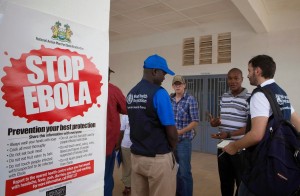
After months of being ignored by much of the mainstream media and U.S. government, the ebola epidemic in West Africa has become headline news. The reason is that a traveler from Liberia—one of the West African countries most severely impacted by the outbreak of the disease—came to Dallas, TX infected with ebola.
The deaths of over 3000 men, women and children in West Africa and the potential for disease to affect upwards of one million more if not stopped, did not catch our attention, but a single case here has put many on edge.
The White House and the Centers for Disease Control (CDC) have since announced new measures to respond the possibility of new ebola cases in the U.S., but some media outlets and commentators have sounded the alarm with the typical stereotyping, bias, and anti-scientific speculation. Some politicians have called for banning all travel from West Africa or extreme measures in airports and at the borders. Absurd talk linking ebola to the ISIS terrorist group and attempts to link ebola fears to immigrant scapegoating surfaced over the weekend.
Meanwhile, the CDC and the World Health Organization have been trying for weeks to reverse the unilateral grounding of flights to and from Liberia and Sierra Leone. Public health officials, including CDC Director Tom Frieden, MD, MPH, say:
“When countries are isolated, it is harder to get medical supplies and personnel deployed to stop the spread of Ebola. And even when governments restrict travel and trade, people in affected countries still find a way to move and it is even harder to track them systematically”
Despite the attempt by some to cynically spread misinformation and promote myths about ebola, the majority of people in the U.S. understand that ebola is a danger – but not a reason to panic. Only 11 percent are “very worried” about being exposed to ebola. Most people, it seems, understand the difference between healthy concern and panic.
So what should be done? First, the U.S. has to be a better global partner. The United Nations asked for financial and human assistance months ago and the U.S. and others were slow to respond. Now the price tag and the task has ballooned. President Obama has order more than 3,000 U.S. troops to go to Liberia for “command a control” and to build 17 ebola clinics. But reports are that the clinics may not be in place for 60-90 days. All the global and regional officials seem to agree that more help is needed, and much faster than it’s currently coming.
One of the biggest problems is the lack of trained medical professionals in the area. While there are certainly logistical and civil engineering needs, doctors, and nurses are key. The U.S. and Europe have not done much on this count so far. The Washington Post reports that the small island nation of Cuba has sent more doctor’s to the ebola-affected areas than any single country – with over 500 doctors either on the ground or on the way.
And there are key lessons from the ebola crisis. We know that medical infrastructure and scientific education are the key to stemming disease outbreaks, not isolation. It also follows that helping the poorest countries in the world develop their own resources helps us all in the long run. We also need to really rethink a government system that can easily mobilize for wars, but not for other pressing emergencies.
In the end, not only is addressing the ebola crisis in the countries most affected the humane thing to do, it is, according to medical experts, the only way to stop the spread of the disease and prevent a regional nightmare from becoming a global disaster.